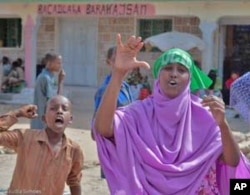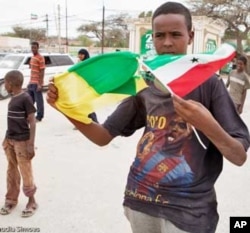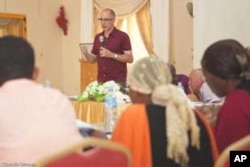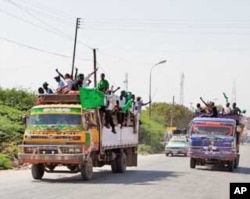Over one million eligible voters go to the polls on Saturday in the break-away enclave of Somalia, Somaliland. It’s the second presidential election since the area unilaterally declared its independence nearly 20 years ago.
President Daahir Riyaale Kaahin of the ruling United Peoples Democratic Party (UDUB) was elected head of state in 2003. He’s running for re-election against two opponents – Faisal Ali Warabe of the Party for Justice and Development (UCID) and Ahmed Mohammed Mohamoud Silanyo of the Peace, Unity and Development Party (Kulmiye).
Among the issues of the campaign is international recognition, says Michael Walls, an international election observer with the Catholic development agency, Progressio. Somaliland has yet to gain diplomatic recognition, despite widespread appreciation for the democratic and free-market system it built with grassroots support.
“The majority of the population of the country wants recognition,” he says, “and the democratization process is seen as a way of persuading other countries to recognize Somaliland as a sovereign nation. That’s an overwhelming theme at rallies and discussions.”
All of the parties are committed to boosting trade and private enterprise, though Walls says the government is limited in what it can do. With no diplomatic recognition, there’s also no formal bilateral aid; most of the funds for operating the government come from taxes and from Diaspora support.
Religious and political moderation
The constitution forbids political parties from using religion as a campaign theme, and Walls says for the most part, religion is not an issue. He says the people of Somaliland follow a moderate interpretation of Islam, which has only come up as an issue once so far in the campaign.
“[Religion] has played a bit of a role in the elections, because one opposition leader [Faisal Ali Waraabe of the UCID] has made statements about introducing Sharia law. He explained that as an expression of the application of constitutional articles that say Sharia must be the basis of Somaliland law. He says he was not arguing anything different. But when he made that argument, he was wanting to play a religious card.”
“There are sympathizers for that,” explains Walls, “there are people who would say democracy is wrong – that they accept Somaliland’s existence in a de facto sense but would not vote because it would support a system they disagree with.”
Personalities v. platforms
Walls says the differences between the parties are based more on personality than platforms, though party leaders sometimes compete over who is more committed to the new political order.
“The argument [put forth by government supporters],” says Walls, “is that the biggest opposition party [Kulmiye, or Peace, Unity and Development Party] is dominated by people who were part of Somali National Movement, the insurgency group that brought down the Siad Barre regime [in 1991] in the northwest. The government claims these guys never wanted Somaliland independence.
“[On the other hand], the [main] opposition party,” he continues, “would say many in government were involved with the Siad Barre regime in some way as functionaries or in more senior positions and they are too conservative and too tied to the past.
“[Lastly], the smaller opposition party [UCID] says ‘the biggest opposition party is the old insurgency group, the government itself was too involved with the old regime, and we’re the only fresh voice in town.’ “
All powerful presidency
The Progressio election observer says the outcome of the polls is of interest to pro-democracy activists in the region, because the power of the executive branch, already strong, appears to be growing.
“The president wields even more power than the executive branch of the U.S. The president appoints ministers, then makes policy in most things. The parliament is the legislative body, but [it] does not have primacy over the decision making process of the executive. A lot is done by decree [and]….outside the legislative process.”
Walls says, “[The parliament] has oversight …. and could decide not to approve the president’s budget [which could] then constrain his ability to act. But that power has not been used effectively. So when parliament has tried to put a stop to executive branch actions or policies by withholding approval for the budget, the president has proceeded anyway. [He in effect uses] the same budget as last year, which means he rolls over last year’s budget and acts as if the last [one] was this year’s budget.”
Human Rights Watch has criticized the government for what it calls violations of domestic and international law, including the by-passing of courts for security committees that answer to the executive branch. The rights group says the government has also cracked down on the media and on critics who have alleged presidential corruption or questioned the monopoly of the three political parties over Somaliland’s politics.
For political observers, the upcoming polls may be an opportunity to reverse the trend.




